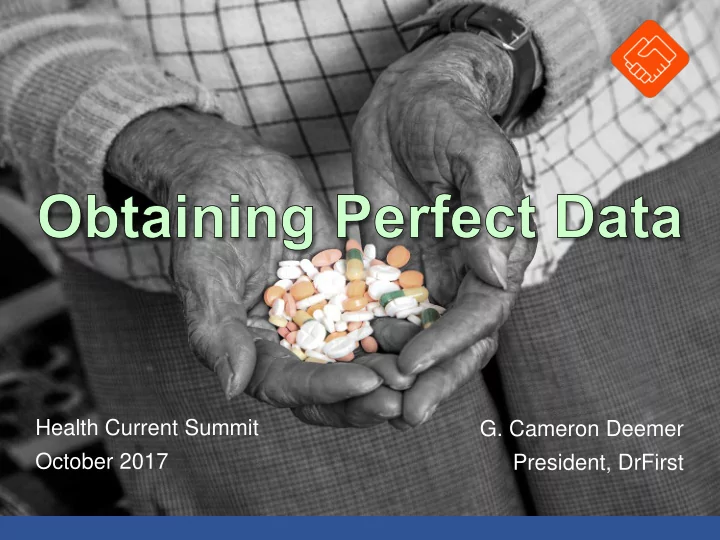

Health Current Summit G. Cameron Deemer October 2017 President, DrFirst
What CMIOs had to say… “You have to make Costco give you records on OTCs and supplements. Then you need to do the same with GNC!”
What we do at DrFirst… 67,000 Connected Pharmacies 100 Million 170,000 Healthcare Users e-Prescriptions Annually 350+ EMR/EHR/HI 21,000 Ambulatory Partners Facilities 1,000+ Hospitals 68,000 Physicians Prescribing Monthly 20 Million Patients Per Year
Overview of the Medication Reconciliation Process When conducted as intended, medication Reconciliation is a conscientious, patient-centered Inter-professional process that supports optimal Medication management A BPMH provides the backbone for medication reconciliation because it consists of 2 aspects: 1. A systematic process for interviewing the Patient and/or family 2. A comprehensive and complete list of The patient’s home or outside medications from a reliable source
Home Meds (Med History) Data Sources Patient/Patient Typically only partially accurate, and Family sometimes not available Calls to Somewhat effective, but not efficient Providers and Pharmacies Med rec data Can be outdated, and mostly only from ambulatory available with integrated homogeneous EHRs EHRs Pharmacy Fill Data Feed Industry options with quantity and quality differentiation Claims Data Feed Becoming more prevalent as eRx Prescription data adoption improves from eRx trans
A perfect medication history is complete, clean and consumable
Industry-standard medication history feeds are far from perfect
The dirty little secrets of industry standard medication history feeds…
Dirty Little Secret # 1: Not complete, and can’t be
So, what’s missing? Non- participating pharmacies Non-participating payers Traditional OTC and Medicaid supplements Veteran’s Prescription Administration s DoD
You are missing, if you change plans With pharmacy claims, PBMs often don’t provide historical data from the previous plan
Dirty Little Secret # 2: Not “clean”
Why not? SIG not available on claims data SIG is often free text, not codified Drug description not standardized to NDC Drug compendia differs by record
Dirty Little Secret # 3: Often not consumable by the hospital
Why not? Free text or mismatched elements cannot import properly Poorly maintained databases help create mismatches Failure to update Limited load of NDCs Hospital-specific nomenclature
How bad is it? For one of the largest HIS systems, only 43% of records “match” A full 57% require manual data entry
What should be available?
Pursuing Perfect Data Quantity of patients Completeness of records QUANTITY All plans, OTC, supplements Track across plan changes Usability of data Proper formatting De-duplication USABLE TYPES Support workflows Match to drug databases Types of information Claims – Who paid for what? Pharmacy – How is drug to be taken? COMPLETE Rx – What was the physician’s intent? Patient-elicited – How is patient self- medicating?
Getting to “perfect” Accept that what’s available is not enough Improving the feed requires partnership and work Plan for almost perfect
Seek more complete record sets If you can only have one type, pick pharmacy fill data Possible Legislation Medication history vendor with existing relationships Contract directly with pharmacy vendors and individual pharmacies
Seek more complete record sets Missing payers and government programs require direct relationships Health Plan Gov’t Hosting payer system PBM
Seek more complete record sets Prescriptions are uniquely valuable and available only from vendors and sites
Seek more complete record sets Patient-elicited data is vital but very difficult
Commit to cleaning De-duplication is the minimum standard Crosswalk NDC/Drug descriptions Ensure hospital database readiness
Don’t neglect usability Present in workflow Minimize manual transcription Provide missing workflow elements Pharmacy name and phone number Provider name and phone number
Bonus: Let’s Talk About PDMP PDMP Integration?
Recommend
More recommend